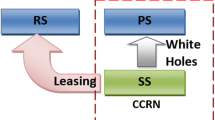Abstract
Spectrum reservation strategy is an effective technology for conserving communication resources in Cognitive Radio Networks. In order to better adapt to changes of the system load, we present an adaptive control approach to determine the reservation ratio of the licensed spectrum for secondary users and propose a novel adaptive spectrum reservation strategy. We then establish a three-dimensional discrete time Markov Chain model to capture the stochastic behavior of users. By using a method similar to that of the matrix geometric solution, we obtain the steady-state probability distribution for the system model, and derive the formulas for some required performance measures of two types of users. Numerical experiments and simulation experiments indicate that the system performance is sensitive to system parameters like the adaptive control factor and the admission threshold. Finally, we construct a system cost function to balance different performance measures, and present an intelligent searching algorithm to optimize the system parameters with the global minimum system cost.










Similar content being viewed by others
References
Marinho, J., Monteiro, E.: Cognitive radio: survey on communication protocols, spectrum decision issues, and future research directions. Wirel. Netw. 18(2), 147–164 (2012)
Federal communications commission (FCC), 2003, Nov, FCC-03-289A1 [Online]. http://harunfoss.fcc.gov/edocs-public/attachmatch/FCC-03-289A1
Zhang, G., Huang, A., Shan, H.: Design and analysis of distributed hopping-based channel access in multi-channel cognitive radio systems with delay constraints. IEEE J. Sel. Areas Commun. 32(11), 2026–2038 (2014)
Tang, P., Chew, Y., Ong, L., Haldar, M.: Performance of secondary radios in spectrum sharing with prioritized primary access. In: Proc. of IEEE Military Communications Conference, pp. 1–7 (2006)
Li, F., Liu, F., Zhu, J.: Reputation-based secure spectrum situation fusion in distributed cognitive radio networks. J. China Univ. Posts Telecommun. 22(3), 110–117 (2015)
Wang, J., Lin, M., Hong, X.: QoS-guaranteed capacity of centralized cognitive radio networks with interference averaging techniques. KSII Trans. Internet Inf. Syst. 8(1), 18–34 (2014)
Anand, S., Sengupta, S., Hong, K.: Exploiting channel fragmentation and aggregation/bonding to create security vulnerabilities. IEEE Trans. Veh. Technol. 63(8), 3867–3874 (2014)
Zhao, Y., Jin, S., Yue, W.: An adjustable channel bonding strategy in centralized cognitive radio networks and its performance optimization. Qual. Technol. Quant. Manag. 12(3), 291–310 (2015)
Balapuwaduge, I., Lei, J., Pla, V., Li, Y.: Channel assembling with priority-based queues in cognitive radio networks: strategies and performance evaluation. IEEE Tran. Wirel. Commun. 13(2), 630–645 (2014)
Liao, Y., Song, L., Han, Z.: Full duplex cognitive radio: a new design paradigm for enhancing spectrum usage. IEEE Commun. Mag. 53(5), 138–145 (2015)
Hong, X., Wang, C., Chen, H.: Secondary spectrum access networks. IEEE Veh. Technol. Mag. 2(4), 36–43 (2009)
Wang, Y., Li, C., L., Wen, T., Wei, X.: Dynamic channel reservation for cognitive radio networks. In: Proc. of IEEE International Conference on Computational Intelligence Communication Technology, pp. 339-343 (2015)
Wang, J., Huang, A., Wang, W.: Admission control in cognitive radio networks withfinite queue and user impatience. IEEE Wirel. Commun. Lett. 2(2), 175–178 (2013)
Jiao, L., Pla, V., Li, F.: Analysis on channel bonding/aggregation for multi-channel cognitive radio networks. In: Proc. of IEEE European Wireless Conference, pp. 468–474 (2010)
Jin, S., Yue, W.: Modeling and analysis of a sleep mode in IEEE 802.16 with switching procedure and correlated traffic. Pac. J. Optim. 8(3), 577–594 (2012)
Hu, H., Xu, Y., Li, Y.: Energy-efficient cooperative spectrum sensing with QoS guarantee in cognitive radio networks. IEICE Trans. Commun. 96(5), 1222–1225 (2013)
Rao, R., Savsani, V., Vakharia, D.: Teaching-learning-based optimization: a novel method for constrained mechanical design optimization problems. Comput. Aided Design 43(3), 303–315 (2011)
Acknowledgements
This work was supported in part by National Science Foundation (No. F61472342), China and was supported in part by MEXT, Japan.
Author information
Authors and Affiliations
Corresponding author
Rights and permissions
About this article
Cite this article
Liu, J., Jin, S. & Yue, W. A novel adaptive spectrum reservation strategy in CRNs and its performance optimization. Optim Lett 12, 1215–1235 (2018). https://doi.org/10.1007/s11590-016-1093-6
Received:
Accepted:
Published:
Issue Date:
DOI: https://doi.org/10.1007/s11590-016-1093-6




